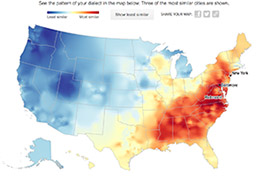The Building Blocks of Linguistics
A companion piece to an interview with linguistic scholar David Pesetsky

A baby with her Mum at a social gathering
"What makes linguistics, the science of language, so fascinating is that it exists at the intersection of science and the humanities. You use a scientific approach, and you get to apply it to something central to humanity."
— Kai von Fintel, MIT Professor of Linguistics
Contents
Introduction | Reading Other Minds
What Is Linguistics?
Quiz: Make Your Personal Dialect Map
Know Your Linguistics Subfields
Top Ten Ways Linguists Help Make a Better World
Endangered Languages
Studying Linguistics
Fun Facts
Best Linguistics Blogs
Meet the MIT Linguistic Faculty
You may also enjoy:
3 Questions with David Pesetsky on the field of linguistics
A Commentary from the MIT Linguistic Faculty on Computing and AI
INTRODUCTION | READING OTHER MINDS
How is it possible that simple acoustic vibrations, hand gestures, and even ink patterns can give one person access to the thoughts of someone else? This is the central question of linguistics.
“We put these signals in the world and others can read our mind to some extent,” says Kai von Fintel, an MIT professor of linguistics. “I find that a baffling phenomenon — why not try to figure that out?”
The following signals and patterns, which provide a brisk overview of the field of linguistics, include some entries from the Linguistic Society of America (LSA) — a destination website! — and are shared with the LSA's generous permission.
FOR STARTERS
What is Linguistics?
In a nutshell: Linguistics is the scientific study of language. Linguists apply the scientific method to conduct formal studies of speech sounds, grammatical structures, and meaning across the world’s 6,000+ languages. They also investigate the history of language families, how language is acquired when we are infants, and the underlying neural structures that enable us to use language.
More at LSA | The Science of Linguistics
WE ARE ALL LINGUISTIC CREATURES
“Whether it’s telling a joke, naming a baby, or using voice recognition software, you’ll find the study of language reflected in almost everything you do.”
More at LSA
Hero, Sub, or Hoagie? | Your Personal Dialect Map
What does the way you speak say about where you’re from?
Most of the questions used in this NYT's quiz are based on those in the Harvard Dialect Survey, a project by Bert Vaux and Scott Golder.
Take Vaux's original quiz (contribute to research)
Take the NYT quiz (receive a personal dialect map)

KNOW YOUR LINGUISTIC SUBFIELDS
Modern linguists concern themselves with many different facets of language, from the physical properties of the sound waves in utterances to the intentions of speakers and the social contexts in which conversations are embedded. The branches of linguistics are concerned with how languages are structured, how languages are used, and how they change. Together, the branches and subfields advance our understanding of how language works.
More at LSA
Subfields Related to the Structure of Language
Phonetics (the production, acoustics, and hearing of speech sounds)
The smallest units of language are studied in the field of phonetics, which concerns itself with the individual sounds produced while speaking.
Phonology (the patterning of sounds)
Phonology takes a look at the small units of sound together in the context of whole utterances and searches for patterns in sound across a language or a whole group of languages.
Morphology (the structure of words)
Morphology is the study of the internal structure of words, how stems come together with prefixes and suffixes to make whole words.
Syntax (the structure or formation of sentences)
Syntax explores the structure of sentences and how this structure interacts with other aspects of languag
Semantics (the study of meaning)
Semantics studies the meaning behind words and combinations of words.
Pragmatics (language use, in context)
The meanings of these combinations when they interact with contextual information, and how they are produced and perceived.
Other subfields
Discover additional linguistics subfields — from Computational Linguistics to Neurolinguistics — at the Linguistics Portal.

TOP TEN WAYS LINGUISTS MAKE THE WORLD A BETTER PLACE
10. Save the world (and make new friends) when extraterrestrials arrive by figuring out their language
More | Alien Speak | Review
9. Advance the use of a community's native language — the language in which children learn best — for education.
The MIT Haiti Project
8. Make the connection between languages and human rights.
More at LSA
7. Help educators figure out how best to teach young children to read.
Language Log | Psychological Science and Reading
6. Help the legal profession understand meaning and ambiguity in the laws they write and interpret.
More at Brooklaw
5. Work with indigenous communities to revitalize endangered languages or revive languages no longer spoken.
Story | MIT Indigenous Language Program | Wampanoag Language Reclamation Project | Jesse Little Doe Baird
4. Advise on programs for Artifical Intelligence systems, platforms, and products.
CIO: On AI and linguistics | Computational linguistics
3. Raise awareness of the rule-obeying nature of all linguistic systems, be it Warlpiri, Japanese, Kreyòl, or African American Vernacular English
Center for African American Language | Story: A Champion of Kreyòl
2. Discover the properties that are common to the structure of all human languages, shedding light on the human mind iteslf, including how language is processed by the brain.
Ask an MIT Linguist | Searching for the building blocks of language
1. Figure out — and let parents know — why the sentence "You can have cake or ice cream" means something completely different to adults than it does to their young children. (Hint: one of these groups think the sentence means they can have both cake and ice cream!)
You can have cake or ice cream
ENDANGERED LANGUAGES
Each human language embodies some unique information about our species and our relation to the world.
"The loss of a language is the loss of an intellectual life and a culture. The death of a language is a disaster. It’s as if someone had dropped a bomb on the Louvre."
— Ken Hale, MIT linguistic scholar (1934-2001)
"Exploring the full range of human languages is to the linguist what examining the abundance of species on the planet is to the biologist. There may well be crucial questions about the structure of human language that can only be answered by working with, say, speakers of Navajo."
— David Pesetsky, Ferrari P. Ward Professor of Modern Languages and Linguistics
Endangered Language Projects at MIT
On Endangered Languages and the Safeguarding of Diversity | by Ken Hale
STUDYING LINGUISTICS
Studying Linguistics
When you study linguistics at any level, you gain insight into one of the most fundamental parts of being human — the ability to communicate through language. Studying linguistics enables you to understand how language works, and how it is used, developed, and preserved over time.
More at LSA | Why Major in Linguistics?
Linguistics as a Profession
A degree in linguistics can prepare you for a career in many different fields, among them: policy, technology, artificial intelligence (AI), medicine, international affairs, teaching, publishing, and forensics.
More at LSA
FUN FACTS
The Linguistic Olympiad
Two fun things: 1) There is a Linguistic Olympiad! And 2) In 2017, MIT hosted the US and Canadian Linguistic Olympiad teams before they went to the international finals.
Official site
What is the best-known Sci-Fi film that features a linguist?
Hint: MIT alumna Jessica Coon of McGill was the linguistics adviser for the film, in which: "Linguistics professor Louise Banks leads an elite team of investigators when gigantic spaceships touch down in 12 locations around the world. As nations teeter on the verge of global war, Banks and her crew race against time to find a way to communicate with the extraterrestrial visitors."
Answer | Decoding the linguistic geekiness of the movie | Alien Speak
How many languages are there in the world?
Best current estimation: approximately 6,909 distinct languages. Of those, only about 200 belong to the Indo-European language family.
More at LSA
LINGUISTIC BLOGS
All Things Linguistics
A daily blog about all things linguistic by Gretchen McCulloch
Language Log
Started in 2003 by Mark Liberman and Geoffrey Pullum
20 Best Linguistic Blogs
Including: Ask the League of Nerds, NPR Codeswitch, and Harmless Drudgery
50th Anniversary Scientific Reunion and Linguistics Symposium, MIT Stata Center, December 2011
MEET THE MIT LINGUISTICS FACULTY
Scientific reunion commemorates 50 years of Linguistics at MIT
"Collectively, this was the group that built the field."
Story | MIT Linguistics Website | Research | Faculty
Suggested Links
Stories
Annauk Denise Olin: Saving An Alaska Native Language
Profile: Christine Soh '20, computational linguistics
Commentary from the MIT Linguistic Faculty on Computing and AI
Three Questions: David Pesetsky on the field of linguistics
Cold case: A linguistic mystery yields clues in Russian
Ask a Linguist: Q&A with David Pesetsky
Donca Steriade: Searching for the building blocks of language
Kai von Fintel: Decoding the meaning of language
Profile of Danny Fox
the Anshen-Chomsky Professor of Language and Thought
Resources
The Linguistics Society of America
This is a destination website! Awesome trove of insight and information.



